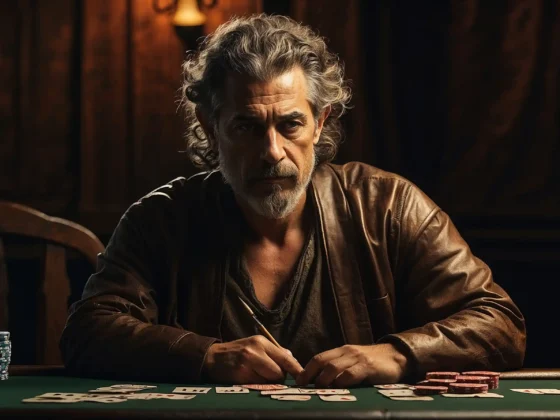Poker is more than just a game of cards—it’s a game of psychology, decision-making, and mental toughness. While the mechanics of poker strategy can be learned through study and practice, it’s the mental game that separates good players from great ones. For poker players looking to master their mental game, Stoicism offers powerful tools to navigate the emotional ups and downs of the game.
In this blog, we’ll explore how Stoic principles can enhance your poker strategy, improve emotional control, and elevate your decision-making skills. By applying Stoicism to your poker mindset, you’ll be able to play with greater focus, patience, and resilience.
The Stoic Foundation: Control What You Can
One of the core tenets of Stoicism is the concept of focusing only on what you can control. In poker, this principle can be a game-changer.
1. Control Your Emotions, Not the Cards
Poker is inherently unpredictable. No matter how skilled you are, you cannot control the cards you are dealt or the decisions of your opponents. However, you can control how you respond to these external factors. Stoicism teaches that the key to emotional stability is accepting what is outside of your control and focusing on what you can influence—your thoughts, actions, and reactions.
- Practical Tip: When you face a bad beat, remember that it’s not the loss itself that defines you—it’s how you react to it. Take a deep breath, regain your focus, and maintain emotional control. Keep your cool, as Seneca advised: “We suffer more often in imagination than in reality.”
2. Decision-Making Based on Rationality, Not Emotion
Poker is a game of rational decisions, but emotions like fear, greed, and frustration often cloud judgment. A Stoic approach to poker involves making decisions based on logic, not on emotional impulses. By detaching yourself from the outcome and focusing on the process, you can make decisions that maximize your long-term success.
- Practical Tip: Before making a move, take a moment to pause. Are your actions being driven by fear or excitement, or are they based on sound reasoning? Practice mindfulness to stay present in the moment and assess the situation without emotional bias.
The Power of Patience: Applying Stoicism to Poker Strategy
1. Understanding Patience as a Virtue
One of the most valuable virtues in Stoicism is patience. The Stoics believed that true strength lies in one’s ability to endure hardship with calm and composure. In poker, patience is equally important. The ability to wait for the right opportunities, rather than rushing into every hand, is a skill that can dramatically improve your results.
- Practical Tip: Cultivate patience by reminding yourself that poker is a long-term game. Avoid chasing every pot or trying to force action. Stick to your strategy and wait for situations where you can maximize your expected value.
2. Embracing the Long-Term View
In poker, as in life, it’s easy to get caught up in short-term results. However, the Stoics believed in focusing on the long-term perspective. In poker, this means understanding that losses are temporary and that your overall skill will determine your success over time.
- Practical Tip: When you experience a downswing, remind yourself that variance is part of the game. Don’t let short-term results affect your long-term strategy. As Marcus Aurelius said, “The impediment to action advances action. What stands in the way becomes the way.”
Mental Toughness: Resilience and Emotional Control at the Table
1. Resilience in the Face of Adversity
Poker is a game full of swings. You will inevitably face adversity in the form of losing streaks, tough opponents, and difficult situations. The Stoics taught that resilience in the face of hardship is a true measure of strength. Rather than dwelling on setbacks, resilient individuals adapt, learn, and persevere.
- Practical Tip: When you encounter a losing streak, resist the temptation to play recklessly or emotionally. Take a step back, reflect, and recalibrate. As Epictetus said, “It’s not what happens to you, but how you react to it that matters.”
2. Emotional Control: Maintaining Composure in Every Hand
Emotions, particularly frustration and anger, can be the downfall of even the best poker players. Stoicism teaches that we should not be ruled by our emotions. Instead, we should practice emotional control by accepting the situation as it is and responding with equanimity.
- Practical Tip: During tough hands or moments of frustration, practice deep breathing or take a short break from the table. Calm your mind before making any major decisions, and remind yourself that emotional stability is crucial to maintaining a winning mindset.
Applying Stoic Wisdom to Poker Tournaments
1. Strategic Focus: The Importance of Discipline
In a poker tournament, maintaining focus for hours can be mentally exhausting. Stoicism teaches that discipline is essential for enduring long and difficult challenges. By staying focused on the present moment and maintaining self-discipline, you can make clear-headed decisions, even in the most intense situations.
- Practical Tip: During long tournaments, take breaks to reset your focus. Use this time to reflect on your strategy, stay hydrated, and clear your mind of distractions.
2. Detaching from the Outcome
One of the core ideas in Stoicism is detachment from the outcome. While many players focus heavily on winning, the Stoic approach is to detach from the results and focus instead on playing your best game. By doing so, you reduce the emotional highs and lows that come with winning and losing, allowing you to stay focused and consistent.
- Practical Tip: Remind yourself that you cannot control the outcome, only the process. Whether you win or lose, if you’ve made the right decisions based on your strategy, you’ve succeeded in the Stoic sense.
Conclusion: Stoicism as Your Poker Superpower
Stoicism provides invaluable tools for mastering the mental game of poker. By adopting a Stoic mindset, you can improve your emotional control, decision-making, patience, and resilience. Poker is a battle of minds, and those who can maintain mental composure and focus are the ones who ultimately prevail. Embrace Stoic principles and turn poker setbacks into stepping stones for growth, learning, and mastery.









3 comments